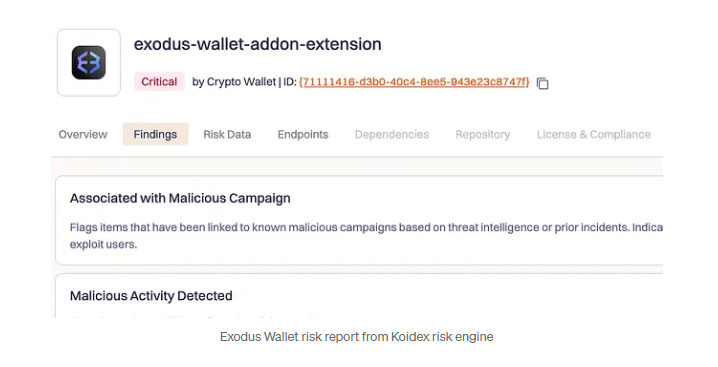A cybercrime group referred to as “GreedyBear” has been accused of stealing over $1 million by what researchers say is likely one of the most wide-reaching crypto theft operations seen in months.
Reports from Koi Security reveal the group is operating a coordinated marketing campaign that mixes malicious browser extensions, malware, and rip-off web sites — all below one community.
Extensions Turned Into Wallet-Stealing Tools
Instead of specializing in only one methodology, GreedyBear has mixed a number of. According to Koi Security researcher Tuval Admoni, the group has deployed greater than 650 malicious instruments in its newest push.
This marks a pointy rise from its earlier “Foxy Wallet” operation in July, which concerned 40 Firefox extensions.

The group’s tactic, referred to as “Extension Hollowing,” begins with publishing clean-looking Firefox add-ons similar to video downloaders or hyperlink cleaners.
These extensions, launched below contemporary writer accounts, acquire faux constructive opinions to look reliable. Later, they’re swapped for malicious variations impersonating wallets like MetaMask, TronLink, Exodus, and Rabby Wallet.
Once put in, they seize credentials from enter fields and ship them to GreedyBear’s management servers.

Malware Hidden In Pirated Software
Investigators have additionally tied practically 500 malicious Windows information to the identical group. Many of those belong to well-known malware households similar to LummaStealer, ransomware much like Luca Stealer, and trojans appearing as loaders for different dangerous applications.
Distribution ceaselessly happens by Russian-language web sites that host cracked or “repacked” software program. Targeting these in search of free software program, the attackers attain far past the crypto group.
Modular malware was additionally discovered by Koi Security, through which operators can add or swap capabilities with out deploying utterly new information.
Fake Crypto Services Created To Swipe Data
Based on stories, along with the browser assaults and malware, GreedyBear has established fraudulent web sites that faux themselves as real cryptocurrency options.
Some of those are mentioned to supply {hardware} wallets, and others are faux pockets restore companies for units similar to Trezor.
Also on supply are faux pockets apps with handsome designs that trick customers into inputting restoration phrases, personal keys, and fee info.
Unlike customary phishing websites that duplicate trade login pages, these rip-off pages look extra like product or help portals.
Reports added that a few of them stay energetic and are nonetheless gathering delicate information, whereas others are on standby for future use.
Investigators discovered that just about all domains tied to those operations lead again to a single IP tackle — 185.208.156.66. This server acts because the marketing campaign’s hub, dealing with stolen credentials, coordinating ransomware exercise, and internet hosting rip-off websites.
Featured picture from Unsplash, chart from TradingView

Editorial Process for bitcoinist is centered on delivering totally researched, correct, and unbiased content material. We uphold strict sourcing requirements, and every web page undergoes diligent evaluate by our group of high know-how specialists and seasoned editors. This course of ensures the integrity, relevance, and worth of our content material for our readers.









